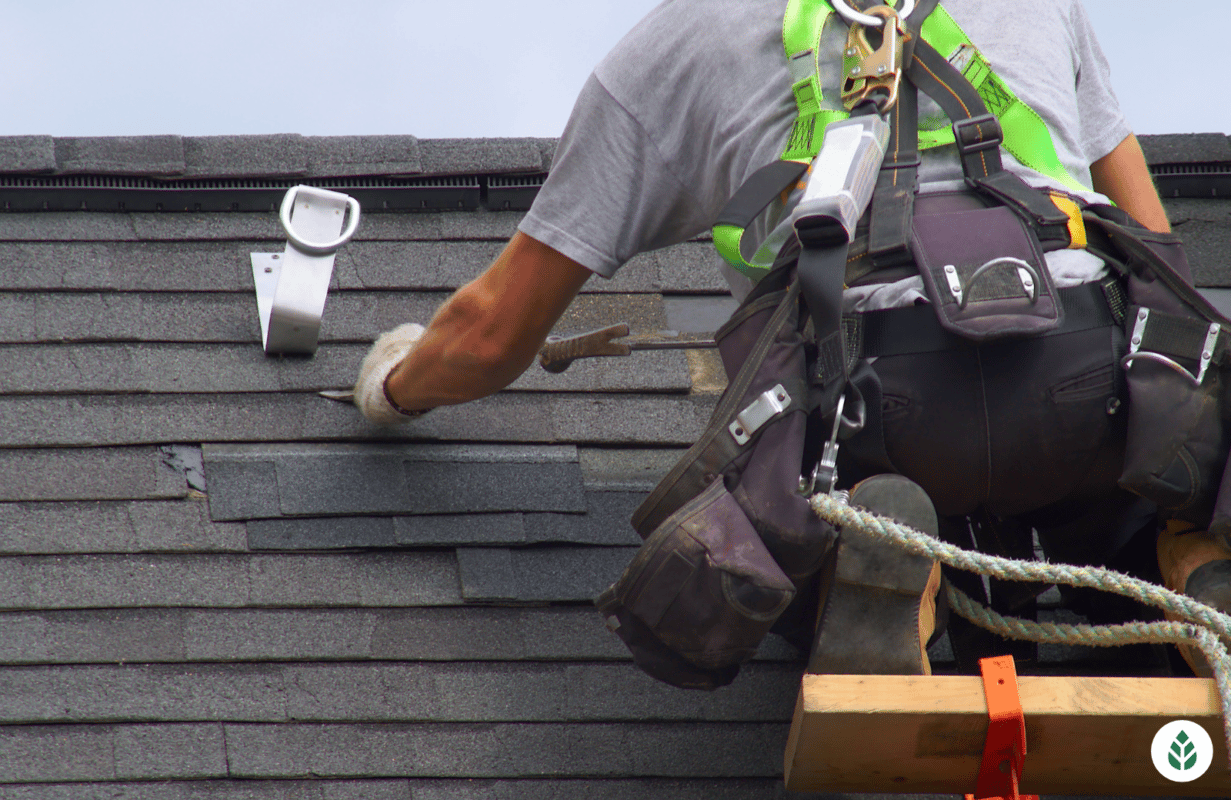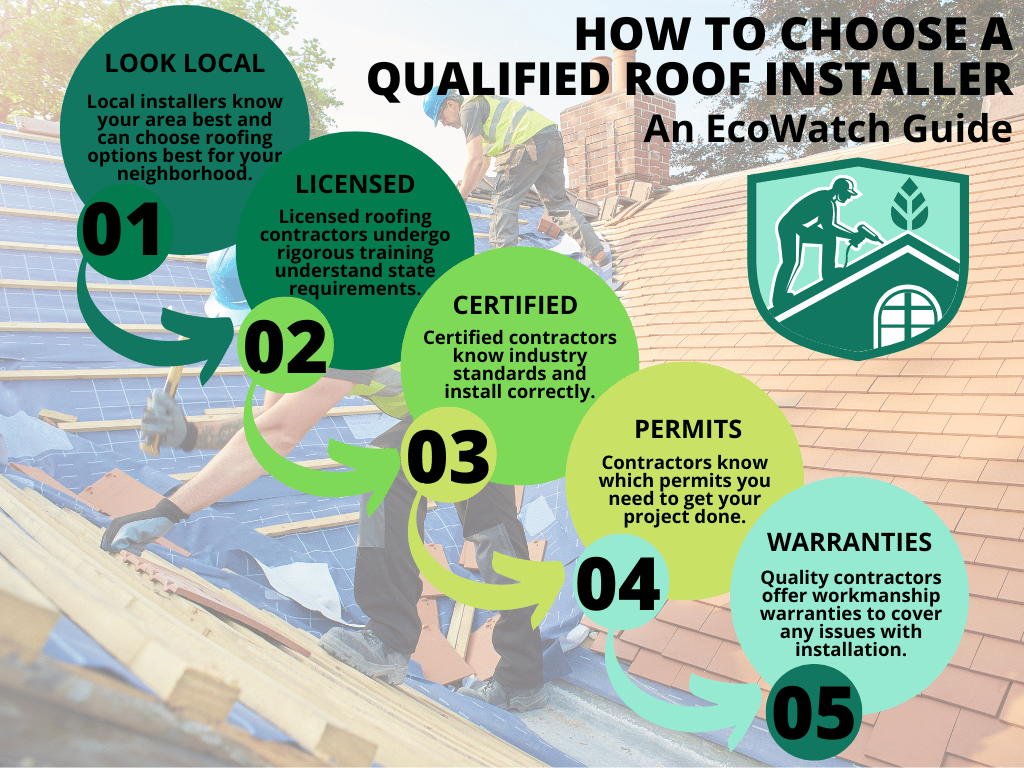

How to Find a Roofing Contractor for Your Home (2024 Guide)
In this guide on finding the right roofing contractor, you’ll learn:
- What’s the difference between a roofing company and a contractor?
- How do you make sure your roofing contractor is reliable?
- What do you need to consider when hiring a roofer?
If you’re looking for tips on hiring a reliable roofing contractor, you’re in the right place. Enter your zip code below to receive a personalized quote on roofing options near you.
Each product and or company featured here has been independently selected by the writer. You can learn more about our review methodology here. If you make a purchase using the links included, we may earn commission.
Whether you need a roof repair or a total roof replacement, hiring a reliable and reputable roofing company is key to guaranteeing the job is done properly.
While you might pay a bit more upfront for a true professional to tackle the job, a repair or roof installation done the right way can save you money in the long run, ensure your home conserves energy and, most importantly, provide long-term protection for your home and family.
In this guide, we’ll discuss how to find a reliable roofer to work on your home. We’ll include information about the different options you have and discuss how to go about ensuring you find the right contractor for your roofing project.
How to Hire a Reliable Roofing Contractor
If you’ve already begun your search for a local roofer, you might be a bit overwhelmed by the number of options you have.
Your roof is one of the most crucial pieces of your home that protects it from the elements, and in some cases, can even generate clean energy. There’s a high demand for roofing work, so there are tons of companies that provide repair and replacement services.
Because your roof is such an important part of your home, you shouldn’t trust just any company to get the job done. Industry experts, such as Marty Ford, Shingle Master and President of Bullet Proof Roof Systems, Ltd¹, know that “Choosing the right roofing contractor is key to getting a quality roof that will last for many years.”
In the sections below, we’ll provide some tips on finding the right roofing contractor for the job and ensuring that the work on your home is done correctly the first time around.
What Qualifications Does a Roofing Contractor Need?
Before you begin the process, it’s best to familiarize yourself with the minimum qualifications necessary for a contractor to operate in your area. The best roofing contractors will be:
- Experienced in your local climate
- Able to provide references and reviews
- Licensed and insured
- Willing to meet with you in person
- Able to provide you with a written quote
To learn more about the checklist of what to look for in a roofer, you can watch the video below.
If you’re ready to connect with vetted contractors in your area, click below to get started.

Power Home

Average cost
Pros
- Positive industry reputation
- Lifetime or lengthy warranty
- 10+ years of experience
- Positive customer reviews
- Uses eco-friendly materials
- Well-trained, certified installers
- Variety of roofing styles available
Cons
- Limited variety of roofing materials
- Short or nonexistent warranty
- No financing information available
- Expensive
- Little information available on company website

Erie Home

Zero Down - 18 months same as cash with minimum monthly payment
Average cost
Pros
- Lifetime or lengthy warranty
- Widespread availability
- 10+ years of experience
- Positive customer reviews
- Uses eco-friendly materials
- Financing options available
- Well-trained, certified installers
- Uses durable materials meant to last
- Variety of roofing styles available
Cons
- Limited variety of roofing materials
- Expensive

Aspen Contracting

Average cost
Pros
- Positive industry reputation
- Lifetime or lengthy warranty
- Widespread availability
- 10+ years of experience
- Positive customer reviews
- Financing options available
Cons
- Little information available on company website
What Are the Steps to Finding a Roofing Contractor?
With that in mind, let’s get into the steps of how to find a reputable roofing contractor.
Know the Difference Between a Roofing Company and a Contractor
First, it’s helpful to understand the different options you have when it comes to roofers. There are two primary types of roofers to choose from: a roofing company and an independent contractor.
Both of these should share the following:
- A general contractor’s license (sometimes not required, based on your state)
- Necessary business insurance (usually worker’s compensation and liability insurance)
- Proven experience with roofing work
- References
The main difference between the two is that a roofing company is a group of roofers and administrative staff that tackle all roof-related jobs, including roof removal and total replacement, new roof installation for new homes, repairs, patches and more.
An independent roofing contractor is usually a single person with a general contractor’s license that can tackle roofing services only, like roof repairs and leak patches. In some cases, an independent contractor can tackle larger projects, but the timeline for doing so is usually much longer.
The upside to working with an independent contractor is that you’ll have one point of contact, your wait time for the work can be shorter and the cost is usually lower.
However, roofing companies more often provide roof warranties for their work, have more accountability and can tackle any roofing job you might have. These include:
- Full roof replacement
- New roof installation
- Gutter installation
- Installing metal roofing
- Solar panel installation (in some cases)
- Removing and re-installing solar panels surrounding repairs or roof replacement
- Major leak repair
- Tackling home additions
- Other general contracting jobs that would be too involved for a single contractor
Get a Referral
Once you decide between a roofing company and a potential contractor, your next step should be to get a referral, if possible.
It’s always safer to choose a company with which a friend or family member has worked. If you aren’t able to get a referral, you can check the company’s online reviews and ratings with the Better Business Bureau (BBB) for more information about what you can expect.
Check Online Reviews and References
Whether or not you’re able to get a referral for a roofer, you should always check the company’s online presence and reviews. As mentioned, you can begin checking for open complaints or pending lawsuits with the BBB, but make sure you’re looking at the company’s local office if it has more than one location.
After checking with the BBB, read through some reviews on sites like Google Reviews or Yelp. Make sure to read positive and negative reviews to get a snapshot of the service you’re likely to receive.
It’s important to remember that virtually all companies will have negative reviews. A single negative comment should be taken lightly, and what you’re looking out for is a pattern of particular customer service issues that repeat from customer to customer.
Check for Licensing and Insurance
Once you’ve decided on a roofing company you believe you can trust, double-check to make sure the company is licensed and insured. According to David Snyder, CEO of Nova Home Buyers, LLC², you can make a grave mistake if you don’t check for proper licensure:
“Many people don’t know roofing can be hazardous for homeowners if not done correctly. Check out the credentials of any roofing contractor before you hire them. It is essential to know that hiring a roofing contractor who is not licensed, and insured can be risky.”
Feel free to call the company and ask for proof of both. Some homeowners are uncomfortable doing this, but any professional contractor or company will have no issue providing this information, and they should expect you to ask.
This step serves to protect you and your home from improper business practices, so make sure you don’t skip over this one.
Meet Your Roofer
After you confirm that the company’s licensing and insurance are in order, you can schedule a consultation with the roofer. This should always be done in person, and you should avoid any roofing companies that provide quotes based on phone calls, provided dimensions or pictures.

When you’re meeting with your roofer, feel free to ask questions about the roofing process and the company. Some recommended questions include:
- How much experience do you have in the roofing industry?
- Do you use subcontractors or do all the work yourself?
- Does the estimate include labor and materials? Are there any other fees?
- Will you be pulling building permits (if required)?
- How do I make payments?
- How long will the project take from start to finish?
- Does the work come with a warranty?
- How do you prevent damaging my house or landscaping in the process?
- What is your clean-up process like?
During this meeting, you can also ask your roofer for references. Many homeowners request references but never actually contact them. We recommend reaching out to those references, as this is a great way to gauge the quality of the roofer’s work in the long term.
Get a Written Quote
Finally, you should request a quote and make sure it’s in writing. Most professional roofing companies will include an itemization for the labor and materials and will sometimes include specifics about the materials they plan to use.
Make sure that the quote fits within your budget and that the timeline for the job completion — which should be included in the written quote — is satisfactory.
Consider Factors Other Than Cost for a Roofer
Finally, it’s important not to focus too much on the overall cost of the job. Of course, the price is an important thing to consider, but you also need to remember that you get what you pay for, and something as important as your roof isn’t the place to cut costs.
Some additional things you might want to consider include the timeline of the job — especially if you need emergency work done to keep your home safe — the professionalism, response time and overall confidence you have in the roofer after meeting with them.
Just remember that peace of mind that the job will be done properly and on time is usually worth paying extra for.
We also suggest considering the quality of the roofing materials used and how they will affect your home’s energy efficiency. The material you install can have a massive impact on the efficiency of your home, so paying for high-quality roof shingles can lower your energy costs in the long run.
If you’re ready to connect with vetted local roofing professionals in your area, click below.
FAQ: How to Find a Roofing Contractor
Below, we’ll answer some of the most common questions we get about hiring a good roofing contractor and how to maximize peace of mind in the process.
Many roof repairs and even some roof replacements can be done as DIY home improvement projects. However, your roof is such a pivotal part of keeping your home protected from damage that it’s often not worth risking doing any roof work yourself.
Hiring a roofer often means the job will get done the right way the first time around. It also often means getting a warranty or satisfaction guarantee for the work. This provides peace of mind for you and your family and the best protection for what is likely your biggest asset.
The average cost to replace an asphalt shingle roof is between $8,000 and $9,000, although this can vary quite a lot.
Some factors that influence the cost include the materials used, the size of your roof, the type of roof you’re replacing, the quality and energy efficiency of the materials you have installed and the contractor you choose.
The tips above should help you find a reliable roofer, but there are some red flags to watch out for to avoid less reputable companies and contractors.
These include delays in response time to your initial inquiry, quotes that are provided without a thorough roof inspection first, a lack of insurance and a lack of the proper licensing and certifications.

 233k
233k  41k
41k  Subscribe
Subscribe 







